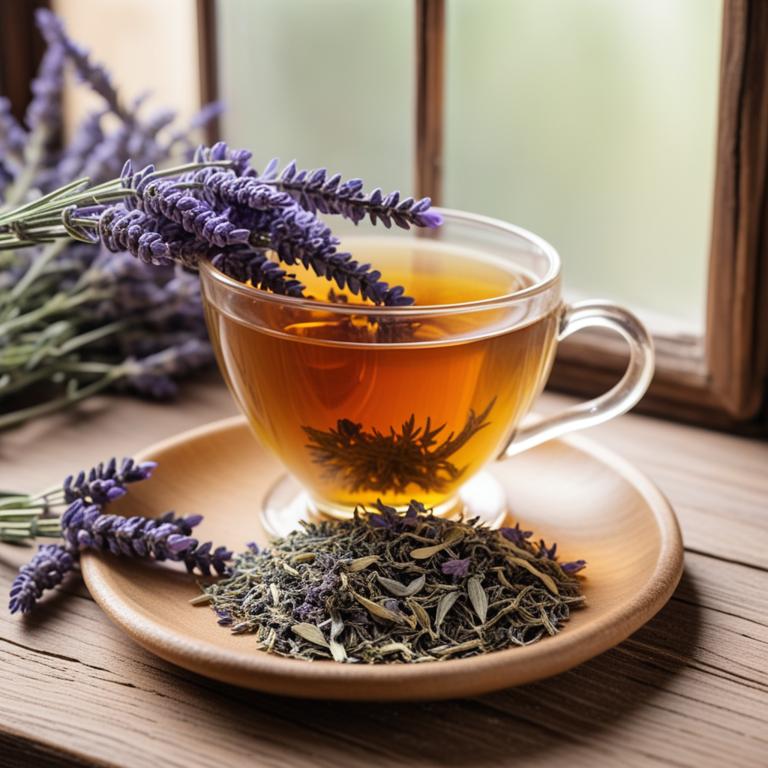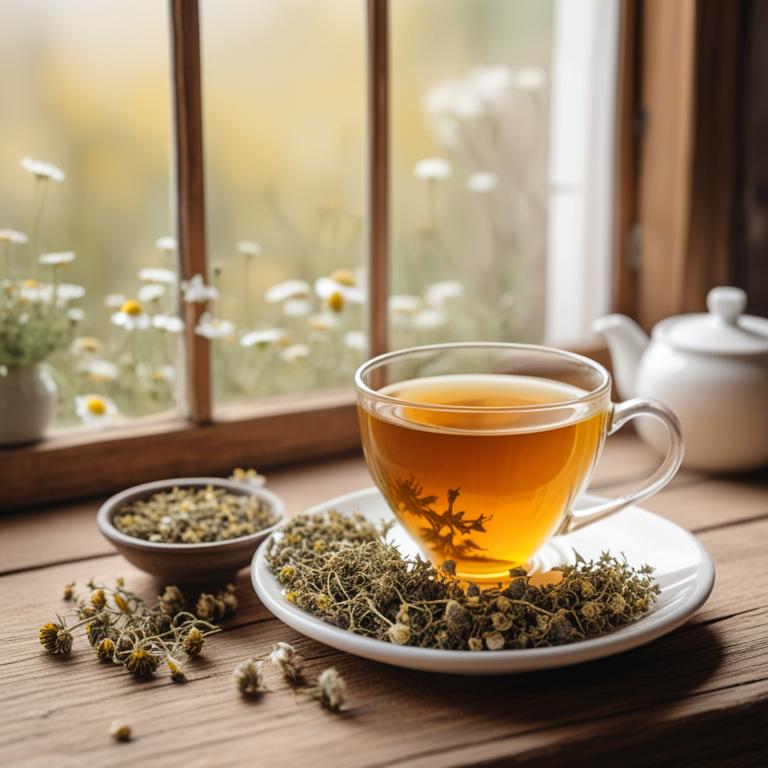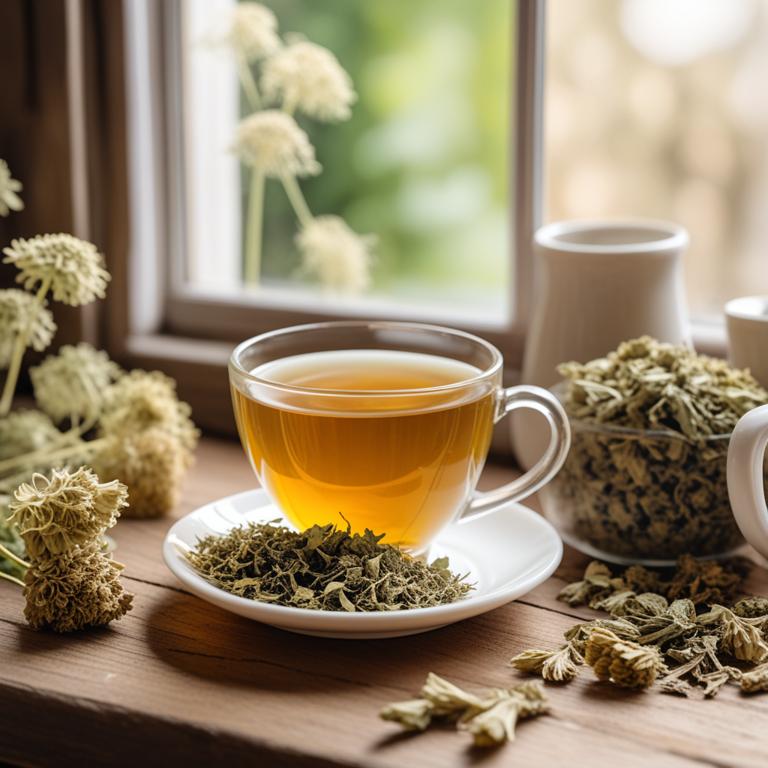13 Best Herbal Teas For Hormonal Imbalance

Herbal teas for hormonal imbalance are a blend of medicinal plants that help to restore balance to the body's endocrine system, which regulates hormones.
These teas are beneficial in treating hormonal imbalances due to their ability to reduce stress, improve sleep, and regulate menstrual cycles.
Examples of herbal teas used to treat hormonal imbalance include Peppermint tea, which reduces stress and anxiety, Chasteberry tea, which regulates menstrual cycles, and Maca tea, which balances estrogen levels.
Additionally, other herbal teas such as Red Clover tea, which reduces menopausal symptoms, Ginger tea, which alleviates menstrual cramps, and Licorice Root tea, which stabilizes mood and reduces cortisol levels, also offer relief from hormonal imbalances.
According to "Primary care", teas for hormonal imbalance may be beneficial, as herbal teas such as black cohosh, St. John's wort, chaste tree, and flaxseed oil (when infused in tea form) have been associated with alleviating symptoms of menopausal symptoms, premenstrual syndrome, mastalgia, and possibly dysmenorrhea.
Below there's a list of the 13 best herbal teas for hormonal imbalance.
- 1. Chamomilla recutita teas
- 2. Glycyrrhiza glabra teas
- 3. Panax ginseng teas
- 4. Valeriana officinalis teas
- 5. Angelica archangelica teas
- 6. Ginkgo biloba teas
- 7. Melissa officinalis teas
- 8. Silybum marianum teas
- 9. Dioscorea villosa teas
- 10. Panax quinquefolius teas
- 11. Urtica dioica teas
- 12. Calendula officinalis teas
- 13. Lavandula angustifolia teas
Also you may be interested in...
TODAY'S FREE BOUNDLE
Herb Drying Checklist + Herbal Tea Shopping List + Medicinal Herbs Flashcards
Enter you best email address below to receive this bundle (3 product valued $19.95) for FREE + exclusive access to The Aphotecary Letter.
$19.95 -> $0.00
1. Chamomilla recutita teas

Chamomilla recutita teas, a popular herbal remedy, have been used to treat hormonal imbalance ailments, such as premenstrual syndrome (PMS) and menstrual cramps.
The anti-inflammatory and antispasmodic properties of this herbal preparation help to alleviate symptoms associated with hormonal imbalances, including anxiety, irritability, and mood swings.
The bioactive constituents of Chamomilla recutita teas, including apigenin and luteolin, have been found to have a sedative effect on the nervous system, thereby reducing stress and anxiety levels.
Regular consumption of Chamomilla recutita teas has been shown to provide relief from hormonal imbalance symptoms, promoting a balanced hormonal system and overall well-being.
Related Study
According to the study, Chamomilla recutita teas may have a beneficial effect on hormonal imbalance in Polycystic Ovary Syndrome (PCOS) by affecting hormone levels.
2. Glycyrrhiza glabra teas

Glycyrrhiza glabra teas, a natural remedy derived from the root of the licorice plant, have been traditionally used to treat hormonal imbalance ailments due to their adaptogenic and anti-stress properties.
The bioactive constituents of this herbal preparation, including glycyrrhizin and flavonoids, help to regulate cortisol levels and alleviate symptoms of hormonal imbalances.
By reducing inflammation and modulating the hypothalamic-pituitary-adrenal axis, Glycyrrhiza glabra teas help to restore balance to the endocrine system, leading to improved overall well-being and reduced symptoms of hormonal imbalances.
The benefits of using Glycyrrhiza glabra teas to treat hormonal imbalance ailments include reduced stress and anxiety, improved mood, and enhanced quality of life.
Related Study
According to "Electronic physician", Glycyrrhiza glabra teas for hormonal imbalance were found to be effective in the treatment of acute menopausal syndrome, particularly in alleviating hot flashes, as part of the diverse mechanisms of herbal medicines employed in the treatment of menopausal symptoms.
3. Panax ginseng teas

Panax ginseng teas have been traditionally used to treat hormonal imbalance ailments, such as polycystic ovary syndrome (PCOS) and menopause symptoms, due to their adaptogenic and antioxidant properties.
The bioactive constituents of Panax ginseng, including ginsenosides, saponins, and polyphenols, help to regulate hormonal balance by reducing stress and inflammation, and improving insulin sensitivity.
By consuming Panax ginseng teas, individuals can experience benefits such as reduced menstrual irregularity, improved mood, and enhanced fertility, making it a popular natural remedy for hormonal imbalance.
The antioxidant properties of Panax ginseng also help to protect against oxidative stress, which can contribute to hormonal imbalance and other health issues.
Related Study
According to "Iranian journal of nursing and midwifery research", Panax ginseng teas for hormonal imbalance, particularly in men, can be beneficial in improving sexual function and increasing normal viscosity of semen, as well as total score of the International Index of Erectile Function.
4. Valeriana officinalis teas

Valeriana officinalis teas have been traditionally used to treat hormonal imbalance ailments, such as menopause and premenstrual syndrome, due to their sedative, anxiolytic, and antispasmodic properties.
The bioactive constituents present in Valeriana officinalis, including valepotriates, valeranone, and isovaltrate, help to reduce stress, anxiety, and promote relaxation, thereby alleviating symptoms of hormonal imbalance.
By regulating the nervous system and promoting a sense of calm, Valeriana officinalis teas help to balance the body's hormonal responses, reducing hot flashes, mood swings, and other associated symptoms.
The benefits of using Valeriana officinalis teas to treat hormonal imbalance ailments include reduced stress and anxiety, improved sleep quality, and a sense of overall well-being, making it a popular natural remedy for menopausal and premenstrual symptoms.
Related Study
According to the study published in "Electronic physician", Valeriana officinalis teas for hormonal imbalance have been identified as one of the effective medicinal plants in the treatment of acute menopausal syndrome, specifically hot flashes, and may play an imperative role in its management.
5. Angelica archangelica teas

Angelica archangelica teas have been traditionally used to treat hormonal imbalance ailments due to their estrogenic and anti-inflammatory properties.
The bioactive constituents, including ferulic acid, umbelliferone, and angelan, help to regulate hormonal balance by inhibiting the production of estrogen-degrading enzymes and modulating the activity of estrogen receptors.
This herbal preparation helps to alleviate symptoms of hormonal imbalance, such as hot flashes and mood swings, by reducing inflammation and promoting relaxation.
The benefits of using Angelica archangelica teas to treat hormonal imbalance include improved sleep quality, reduced anxiety and stress, and a balanced hormonal profile.
6. Ginkgo biloba teas

Ginkgo biloba teas have been traditionally used to treat hormonal imbalance ailments due to their adaptogenic properties, which help the body adapt to stress and balance hormone levels.
The bioactive constituents of Ginkgo biloba, including flavonoids, bilobalide, and ginkgolides, have anti-inflammatory and antioxidant properties that help to reduce oxidative stress and inflammation associated with hormonal imbalances.
Drinking Ginkgo biloba tea may help to alleviate symptoms of hormonal imbalance, such as mood swings, hot flashes, and night sweats, by promoting a balance between estrogen and progesterone levels.
The benefits of Ginkgo biloba tea in treating hormonal imbalance include improved mood, reduced stress, and enhanced overall well-being, making it a popular natural remedy for women experiencing menopause symptoms.
Related Study
According to "Electronic physician", Ginkgo biloba teas may be effective in the treatment of hormonal imbalance, specifically in acute menopausal syndrome with hot flashes, but further studies are required to confirm its efficacy.
7. Melissa officinalis teas

Melissa officinalis teas, derived from the leaves of the lemon balm plant, have been traditionally used to treat hormonal imbalance ailments, particularly in women experiencing premenstrual syndrome (PMS) and menopausal symptoms.
The properties of Melissa officinalis teas that help to treat this ailment include its anti-inflammatory and antioxidant effects, which help to regulate hormonal fluctuations and alleviate symptoms such as mood swings and hot flashes.
The bioactive constituents of Melissa officinalis teas, including rosmarinic acid, citral, and limonene, contribute to its therapeutic effects, as they have been shown to exhibit estrogenic activity, anti-stress properties, and modulate the hypothalamic-pituitary-adrenal axis.
The benefits of Melissa officinalis teas in treating hormonal imbalance ailments include reduced symptoms of anxiety and depression, improved sleep quality, and a decrease in the severity of PMS and menopausal symptoms.
Related Study
According to "Iranian journal of pharmaceutical research : IJPR", Melissa officinalis teas may be a safe and effective herbal medicine for improving hormonal imbalance related to decreased sexual desire in women.
8. Silybum marianum teas

Silybum marianum teas, also known as milk thistle tea, have been traditionally used to treat hormonal imbalance ailments due to its antioxidant and anti-inflammatory properties.
This herbal preparation helps to treat hormonal imbalance by regulating estrogen levels, reducing oxidative stress, and promoting liver health, which is crucial in metabolizing hormones.
The bioactive constituents of Silybum marianum teas, including silymarin and flavonoids, have been shown to have a hepatoprotective effect, protecting the liver from damage and promoting the clearance of estrogen metabolites.
The benefits of this herbal preparation include reduced symptoms of hormonal imbalance, such as mood swings, hot flashes, and weight gain, and improved overall liver health.
Related Study
According to "Phytotherapy research : PTR", Silybum marianum teas may be helpful in reducing the frequency and severity of hot flashes in women with hormonal imbalances, such as those experiencing menopausal symptoms.
9. Dioscorea villosa teas

Dioscorea villosa teas have been used for centuries to treat hormonal imbalance ailments, particularly menopause symptoms, due to their rich content of bioactive constituents such as diosgenin, saponins, and phenolic compounds.
These compounds help to regulate hormonal imbalances by reducing the production of cortisol and increasing the production of estrogen, thereby alleviating symptoms such as hot flashes, mood swings, and vaginal dryness.
The anti-inflammatory and antioxidant properties of Dioscorea villosa teas also contribute to their therapeutic effects by protecting the body from oxidative stress and promoting overall well-being.
By consuming Dioscorea villosa teas, women can experience relief from menopause symptoms and maintain a healthy hormonal balance, promoting a better quality of life.
Related Study
According to "Disease-a-month : DM", Dioscorea villosa teas may help alleviate the symptoms of perimenopause, but more study is needed on its efficacy for hormonal imbalance.
10. Panax quinquefolius teas

Panax quinquefolius teas, derived from the American ginseng plant, have been traditionally used to treat hormonal imbalance ailments such as polycystic ovary syndrome (PCOS) and menopause symptoms.
The bioactive constituents of this herbal preparation, including ginsenosides and ginsenolic acids, possess anti-inflammatory, antioxidant, and adaptogenic properties that help to regulate hormonal balance and alleviate associated symptoms.
By modulating the hypothalamic-pituitary-adrenal axis, Panax quinquefolius teas can help to normalize cortisol levels, improve insulin sensitivity, and reduce androgen production, ultimately leading to a reduction in symptoms such as acne, hirsutism, and mood disturbances.
The benefits of using Panax quinquefolius teas to treat hormonal imbalance ailments include improved overall health, reduced risk of chronic diseases, and enhanced quality of life.
11. Urtica dioica teas

Urtica dioica teas have been traditionally used to treat hormonal imbalance ailments due to their anti-inflammatory, antioxidant, and estrogen-regulating properties.
This herbal preparation helps to treat hormonal imbalance by reducing inflammation and promoting hormonal balance in the body.
The bioactive constituents of Urtica dioica teas, including flavonoids, phenolic acids, and saponins, play a crucial role in regulating estrogen levels and alleviating symptoms associated with hormonal imbalance.
The benefits of using Urtica dioica teas to treat hormonal imbalance include reduced symptoms of hot flashes, night sweats, and mood swings, as well as improved overall hormonal balance and reduced risk of estrogen-related disorders.
12. Calendula officinalis teas

Calendula officinalis teas have been traditionally used to treat hormonal imbalance ailments due to their anti-inflammatory, antispasmodic, and antihormonal properties.
The bioactive constituents of Calendula officinalis, including flavonoids, saponins, and triterpenes, help to regulate hormonal imbalances and alleviate symptoms associated with this condition.
Drinking Calendula officinalis teas may help to soothe the hormonal imbalances, reduce stress and anxiety, and promote a sense of calmness and balance in the body.
The benefits of using Calendula officinalis teas to treat hormonal imbalance ailments include reduced symptoms of PMS, menopause, and PCOS, as well as improved overall hormonal balance and well-being.
Related Study
According to "BioMed research international", Calendula officinalis teas for hormonal imbalance may help improve oxidative stress and restore folliculogenesis in rats with PCOS, potentially leading to increased ovulation.
13. Lavandula angustifolia teas

Lavandula angustifolia teas, also known as English lavender tea, have been traditionally used to treat hormonal imbalance ailments due to their calming and balancing properties.
The bioactive constituents of this herbal preparation, including linalool and linalyl acetate, help to reduce stress and anxiety, promoting a balance in the hormonal system.
This tea helps to treat hormonal imbalance ailments by regulating the body's response to stress, thereby reducing the production of stress hormones such as cortisol, which can contribute to hormonal imbalances.
Regular consumption of Lavandula angustifolia teas has been found to have numerous benefits in treating hormonal imbalance ailments, including reduced symptoms of anxiety and depression, improved sleep quality, and a decrease in the severity of menstrual cramps.
Related Study
According to "Fitoterapia", Lavandula angustifolia teas for hormonal imbalance, specifically in the treatment of polycystic ovary syndrome (PCOS), were found to effectively increase progesterone levels and regulate menstrual cycles, similar to metformin.